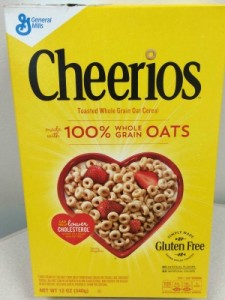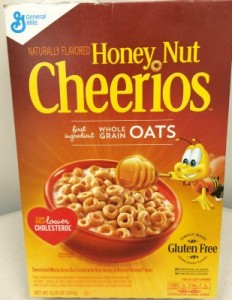At least 125 people became sick after eating Cheerios and Honey Nut Cheerios that contained gluten but were labeled as gluten free, according to the U.S. Food and Drug Administration (FDA). Most of those sickened reported gastro-intestinal problems. The products are safe to eat for anyone who is not gluten intolerant, does not have celiac disease, or is not allergic to wheat.
Minneapolis-based General Mills issued a recall for 1.8 million boxes of the cereals on October 5 after discovering the problem. Other varieties of Cheerios are not affected.
“We recognize the importance of this issue to people with celiac disease, wheat allergy, and gluten sensitivity, and we will continue to provide updates and advice as needed,” the FDA said in statement. After receiving reports of illness, the agency tested 36 samples of Cheerios products labeled as gluten-free from different manufacturing facilities and lots. To meet the FDA’s definition of gluten free, products must contain less than 20 parts per million (ppm) of gluten. Most of the samples the agency tested were under that limit, but one sample of Honey Nut Cheerios contained 43 parts per million (ppm) of gluten.


The company is transitioning five varieties of Cheerios to gluten free including Apple Cinnamon Cheerios, Frosted Cheerios, MultiGrain Cheerios, Cheerios and Honey Nut Cheerios. The recalled products were produced at a plant in Lodi, California, where wheat flour was inadvertently introduced into the gluten-free oat flour. The company has added another layer of testing to prevent the problem from happening again.
The recalled Honey Nut Cheerios have these “Better If Used By” dates: 12JUL2016LD, 13JUL2016LD, 14JUL2016LD, 15JUL2016LD, 16JUL2016LD, 17JUL2016LD, 18JUL2016LD, 19JUL2016LD, 20JUL2016LD, 21JUL2016LD, 22JUL2016LD, 23JUL2016LD, 24JUL2016LD, and 25JUL2016LD. The recalled Cheerios have these “Better If Used By” dates: 14JUL2016LD, 15JUL2016LD, 16JUL2016LD, and 17JUL2016LD.
People with celiac disease, wheat allergy or gluten intolerance should not eat these products as they risk illness if they do. The recalled products should be discarded or returned to the place of purchase. Consumers who have had adverse reactions should see their health care providers and mention exposure to the undeclared allergen.
Gluten is the protein in wheat, rye and barley. For people with celiac disease, gluten intake gradually damages the intestines, prevents the absorption of vitamins and minerals, and can lead to other health problems. Symptoms can include diarrhea, fatigue, headaches, abdominal pain, brain fog, rashes, nausea, vomiting, and other reactions.
People with a wheat allergy run the risk of serious or life-threatening allergic reaction if they eat wheat. Symptoms may include swelling, itching or irritation of mouth or throat, difficulty breathing, nasal congestion, itchy or watery eyes, rash or hives, headaches, nausea, vomiting, cramps, diarrhea, or anaphylaxis, a potentially life-threatening reaction.




